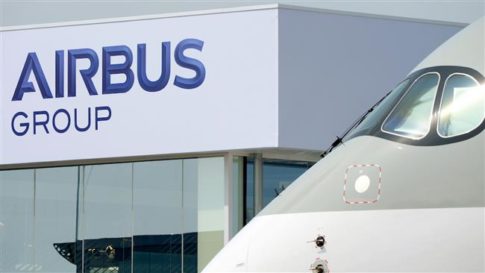– The Future Of The Airbus A380 Hinges On Just One Emirates Order:
Once seen as Airbus’s signature product, the massive A380 – Europe’s delayed and exagerated response to the 747 Jumbo Jet – is in danger of being discontinued by the European aerospace giant if it fails to win a lucrative contract from the Dubai’s Emirates air line, according to Reuters. The company is already drawing up contingency plans to phase out production of the A380, the world’s largest commercial aircraft, Reuters reported.
The moment of truth for the slow-selling airliner looms after just 10 years in service and leaves one of Europe’s most visible international symbols hanging by a thread, despite a major airline investment in new cabins unveiled this month.
“If there is no Emirates deal, Airbus will start the process of ending A380 production,” a person briefed on the plans said. A supplier added such a move was logical due to weak demand.
Once considered flagship brands for their respective airlines, demand for jumbo jetliners like the A380 – which was introduced 10 years ago to help Airbus compete with the Boeing 747 – has sagged as air lines have favored smaller twin-engine aircraft that are cheaper to fuel and maintain.
Emirate has been a notable exception to this trend. The airline has long championed the A380, and has ordered a total of more than 142 total aircraft. But according to Reuters, talks between Airbus and Emirates over a new order for 36 superjumbos worth $16 billion broke down at the Dubai Airshow last month. Negotiations are said to have resumed – but a deal for the new jets is far from assured.
In an amusingly circular twist, although airlines such as British Airways have expressed interest in the A380, Airbus is reluctant to keep factories open without the certainty that a bulk order from Emirates would provide. Meanwhile, Emirates is hesitant to order more planes without assurances from Airbus that production for the planes will continue for another decade.
Regardless of whether Emirates decides to buy or not, one thing is clear: To justify continuing production of the jumbo jet, Airbus needs to sell at least another 30 – possibly more – to compensate for its customers’ demands for increasingly steep discounts thanks to intensifying competition from its archrival, Boeing.
Furthermore, Airbus is already refocusing its energies on the lighter aircraft. As we reported in October, Airbus has decided to buy a stake in troubled Canadian aircraft maker Bombardier’s C-Series – a decision that was widely interpreted as a direct strike against Boeing. Bombardier and Boeing are locked in a momentous trade battle that has seen the Department of Commerce slap a massive 300% tariff on the jet following a complaint by Boeing.
Yet if talks with Emirates succeed, Reuters said there is a glimmer of hope for the double-deck jet. As congestion on the world’s runways worsens, Airbus said it expects its jumbo jet will once again become popular.
The Reuters report represents a marked shift in the outlook for the A380. Indeed, earlier this month, Singapore Airlines, which first introduced the A380 to passengers in 2007, showcased an $850 million cabin re-design this month and expressed confidence in the model’s future.
However, Airbus says it hopes to use an Emirates order to stabilize output and establish a safety net from which to attract A380 sales to other carriers, but has ruled out trying to do this the other way round, industry sources said.
As of the end of November, Airbus had won orders for 317 A380s and delivered 221, leaving 96 unfilled orders.
But based on airlines’ intentions or finances, 47 of those are unlikely to be delivered, according to industry sources, which halves the number of jets in play.
Airbus needs to sell at least another 30 to keep lines open for 10 years and possibly more to justify the price concessions likely to be demanded by any new buyers.
To bridge the gap, Airbus plans to cut output to six a year beyond 2019, from 12 in 2018 and 8 in 2019, even if it means producing at a loss, Reuters recently reported.
Chief Operating Officer Fabrice Bregier confirmed this month Airbus was looking at cutting output to 6-7 a year.
If Airbus does decide to wind down production, some believe Emirates will ask Airbus to deliver the remaining 41 it has on order and then keep most A380s in service as long as possible. But once the airline discontinues the A380, many of these jets are still likely headed for the scrap heap.
* * *
PayPal: Donate in USD
PayPal: Donate in EUR
PayPal: Donate in GBP
